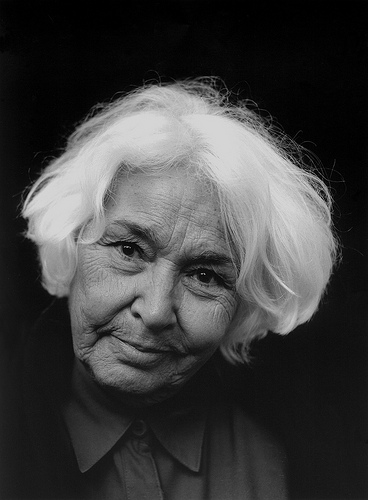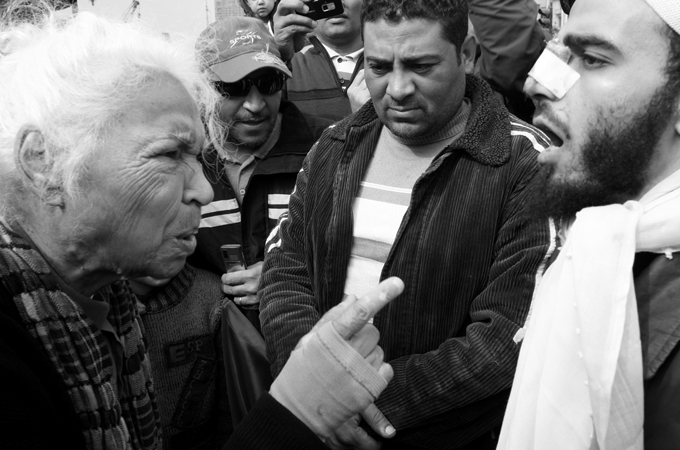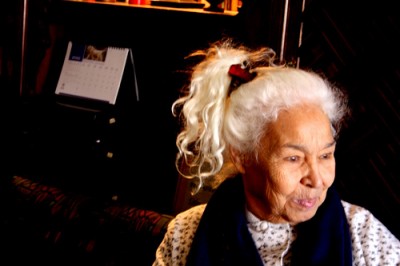Egyptian Writer Nawal El Saadawi: “Hope is Power”
by Olivia Stransky / August 18, 2011 / No comments

Photo: Oslo Mela Festival via Flickr
For the past seven months Tahrir Square has been packed with men, women, and children holding signs: “Egypt Says No to Injustice,” “Enough is Enough!” and “Who’s Afraid of Twitter?”
Egyptians knew that getting Former President Mubarak to step down was only the first step towards reforming their country. Now they are protesting to set solid democratic foundations, revitalize public institutions, and demand that Mubarak faces a real trial.
Among the protesters stands one person who has seen Egypt’s suffering up close: From treating abused and mutilated child-brides in rural areas to battling with former First Lady Suzanne Mubarak, Nawal El Saadawi has fought for change in Egypt for a long time. At seventy-nine years old, she sees this revolution as a chance for women to declare their rights—a chance that she has been waiting for since she was circumcised as a young girl. A feminist, writer, activist, physician, psychiatrist and the author of over forty works of fiction and nonfiction, El Saadawi has been called the Simone de Beauvoir of Egypt.
El Saadawi’s is also an outspoken opponent of female genital mutilation and the social restrictions placed on Egyptian women. Her first work of non-fiction, Women and Sex, evoked the anger of highly placed political and theological authorities, who not only banned her book but also fired her as the Director of Public Health. One of her most famous novels, Woman at Point Zero, was inspired by a female prisoner on death row who El Saadawi met. The novel follows a woman who is repeatedly abused by the patriarchal Egyptian society.
Despite being imprisoned and forced into exile, El Saadawi has created the Arab Women’s Solidarity Association, served as the UN advisor for the Women’s Program in Africa and the Middle East, and co-founded the Arab Association for Human Rights.
On August 12th I spoke with El Saadawi over the phone. Although I had many things to ask her, she only had 15 minutes to answer my questions. Despite the brevity of the interview, Nawal El Saadawi said much to be considered about the state of unrest in Egypt.
What differences are there between the protests going on now and the ones from earlier this year? Have your expectations/attitudes changed?
Mubarak, the head of the regime, was removed, but the body of the regime is still there, ruling and dominating the media and the government and everything. So the revolution is continuing. We asked for Mubarak to be on trial; he was on trial on the 3rd of August, but many people are not satisfied with the trial because they felt that Mubarak did not look like somebody who was accused. Many people feel that the counter-revolution is working to abort the revolution, and that they made this trial to absorb the anger of the people. People are not yet convinced by the trial,. Of course it was a step to put Mubarak and his people on trial, but still it’s not enough because many things can happen under the law.
Under a patriarchal capitalist system the world’s laws have double standards and many defects. Many people are not really confident in the result of the trial, but generally I can say that most of the people are optimistic—including myself— because hope is power. Hope is power, and if we lose hope we lose our power.
People are still struggling because many people were killed, many people lost their sight. But we cannot go back to a dictatorship and its corruption. We need democracy, real democracy, not false democracy. So the struggle will go on everywhere, not just in Egypt but in Syria, in Israel, in Britain, in the US, in Libya, in Bahrain, in Yemen—everywhere that people are fed up with the capitalist military patriarchal system.
My understanding is that people are actually dissatisfied with the economic situation. Recent protests were also due to a new budget which was approved with large social cuts, right?
Yes people are very angry because the Mubarak regime was corrupt and there was failure of development, and neocolonial American intervention in our economy and all that. People are fed up with the economic system, globally and locally.
You see what’s happening in the United States right now, capitalism is collapsing. It cannot go on like this with half of the people in the world going hungry. You see in the protests in Britain and in Israel and everywhere that people are angry with their governments because of the economic situation, and the corruption, and the poverty, and the collapse of social life, and reduction of social benefits. It’s not only in Egypt that the economy is bad and that social benefits are cut, it’s universal.
The whole capitalist system is collapsing because it’s very unfair to women and the poor. Now the poor, women, and young people who are unemployed, are revolting. I cannot discuss Egypt in isolation from America and Israel and Britain because we live in one world, not three worlds, and we are affected by each other. In Israel the demonstrators say “We are revolting like Egyptians” and in Wisconsin and Britain they say “Walk like an Egyptian,” so right now everybody is inspired by the Egyptian revolution.

Feminist Nawel el-Saadawi arguing in Tahrir Square that both sexes ought to be able to pray together in mosques EPA via Al Jazeera
Well it’s very inspiring!
Yes it is, because we live in one world so the percussion of the revolution in Egypt is transferred into Libya, into everywhere.
Could we talk about the efforts of women in this revolution?
Well in Egypt now we are reestablishing the Egyptian Women Union which was banned by Suzanne Mubarak and her ministers. We are now gathering together women and men—because women’s issues are not just for women anymore, there are many young men from Tahrir Square who have joined the Egyptian Women Union.
There is a backlash against women’s rights by the growing power of the most fanatical right-wing religious groups, so we are establishing our union in order to fight back.
What do you think of the role that international media has played in covering the uprisings?
Very bad. Really very bad. I was in London a few days ago, and I was interviewed by CNN or some international media. I don’t remember. The way they conducted the discussion, they tried to cut me, they tried to censor me. I was censored by the international media in Washington when I spoke to Christiane Amanpour.* She censored me; she cut my talk because every media has its own agenda according to its own interests.
The media is not interested in the revolution for Egyptians’ benefits but for its own interests. So the media is like the military; it’s like capitalism, and companies, and the free market. The media serves the military patriarchal system, and that’s why the media lies. The media is full of lies! You cannot know truth through the media. You have to live the situation for yourself. It’s not only the media, it’s everything. For so long power, not justice, has dominated the world. Everything is allowed—cheating, lying, deception—by the heads of states!
*Sampsonia Way contacted Ms. Amanpour for a response through the “This Week with Christiane Amanpour” website and did not receive a reply.





